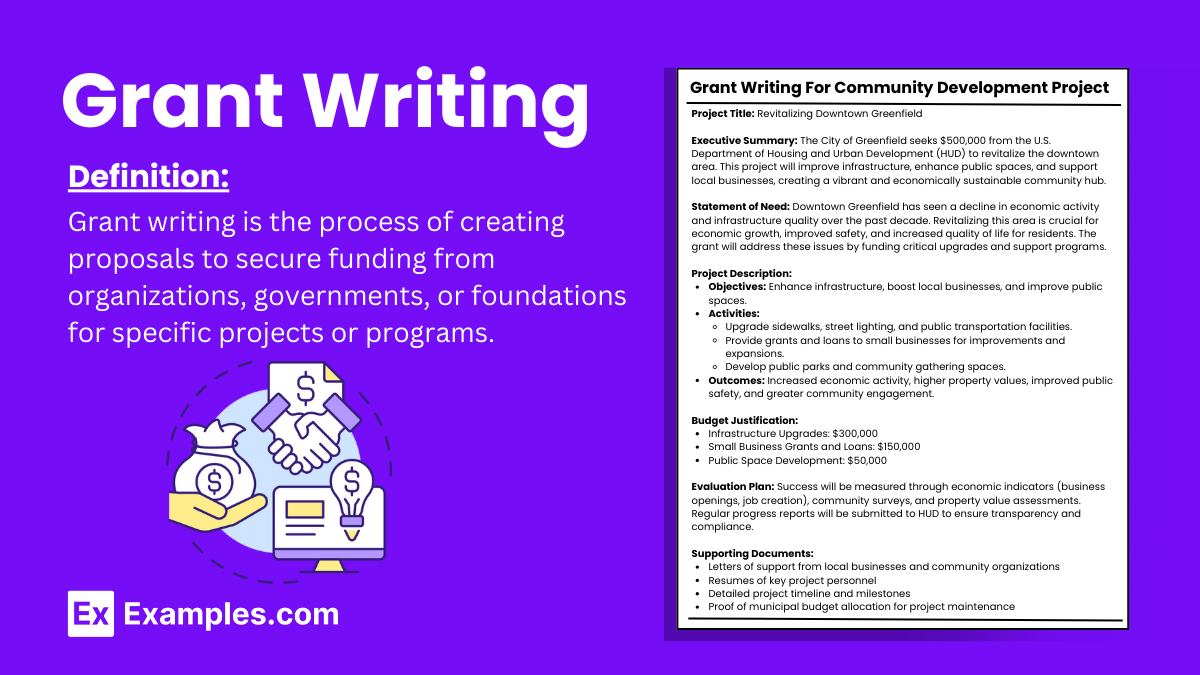8+ Grant Writing Examples
Are you passionate about making a positive impact on your community or furthering a cause dear to your heart? If so, you might be interested in securing funding through grants. Grant writing is an essential skill that can help you secure the financial resources needed to turn your vision into a reality. In this article, we’ll delve into the world of grant writing, offering you a step-by-step guide, practical examples, and answers to frequently asked questions. By the end, you’ll be well-equipped to write compelling grant proposals and increase your chances of success.
What is Grant Writing?
Grant writing is the art of crafting persuasive proposals to secure financial support from organizations, government agencies, foundations, or private donors. It’s a meticulous process that involves presenting a convincing case for why your project or initiative deserves funding. Successful grant writing goes beyond just outlining your project; it’s about establishing a strong connection between your cause and the interests and objectives of potential funders.
Grant Writing Examples for Education
1. Technology Integration in Classrooms
Project Title: Enhancing STEM Education with Modern Technology
Executive Summary: This project aims to enhance STEM (Science, Technology, Engineering, and Mathematics) education at [School Name] by integrating modern technology into the classroom. We seek $50,000 to purchase interactive whiteboards, tablets, and STEM-related software to facilitate hands-on learning and improve student engagement and achievement.
Statement of Need: In today’s digital age, technology integration in education is crucial for preparing students for future careers. Our school lacks sufficient technological resources, limiting our ability to provide students with a modern, interactive learning experience. This funding will address this gap, ensuring that our students are not left behind in the digital era.
Project Description:
- Objectives: Improve student engagement and achievement in STEM subjects.
- Activities: Purchase and install interactive whiteboards, tablets, and educational software. Train teachers on effectively using these tools in their curriculum.
- Outcomes: Increased student engagement, higher test scores in STEM subjects, and improved digital literacy among students.
Budget Justification:
- Interactive Whiteboards: $20,000
- Tablets: $15,000
- Educational Software: $10,000
- Teacher Training: $5,000
Evaluation Plan: We will measure success through pre- and post-project student assessments, teacher surveys, and analysis of STEM subject test scores.
2. After-School Enrichment Programs
Project Title: After-School Enrichment for Academic and Social Growth
Executive Summary: This project aims to establish an after-school enrichment program at [School Name] to support academic and social growth among students. We seek $30,000 to offer a variety of activities, including tutoring, arts, and sports, providing a safe and constructive environment after school hours.
Statement of Need: Many students at our school lack access to structured after-school activities, which are crucial for their overall development. This program will offer a balanced mix of academic support and recreational activities, addressing both educational and social needs.
Project Description:
- Objectives: Provide academic support and promote social development through diverse after-school activities.
- Activities: Offer tutoring sessions, arts and crafts, sports, and recreational activities. Hire qualified staff and purchase necessary materials.
- Outcomes: Improved academic performance, enhanced social skills, and reduced behavioral issues.
Budget Justification:
- Staff Salaries: $20,000
- Program Materials: $5,000
- Sports Equipment: $5,000
Evaluation Plan: Success will be measured through student attendance records, academic performance reports, and feedback from students, parents, and staff.
Grant Writing Examples for Small Business
Securing grants for small businesses can provide essential funding to support growth, innovation, and community impact. Below are examples of grant writing tailored for small business needs:
1. Small Business Expansion
Project Title: Expanding GreenEarth Organics to Meet Growing Demand
Executive Summary: GreenEarth Organics seeks $75,000 in grant funding to expand our operations, meet increasing customer demand, and create new jobs in our community. This funding will be used to lease additional space, purchase new equipment, and hire additional staff.
Statement of Need: Our business has experienced significant growth over the past two years, resulting in increased demand that our current facilities cannot accommodate. Expanding our operations will allow us to better serve our customers, increase our production capacity, and contribute to local economic development by creating new job opportunities.
Project Description:
- Objectives: Increase production capacity, improve customer service, and create 10 new jobs within the next year.
- Activities: Lease a new facility, purchase necessary equipment, and recruit and train new employees.
- Outcomes: Enhanced production capabilities, faster order fulfillment, improved customer satisfaction, and economic growth in the community.
Budget Justification:
- Lease for Additional Space: $30,000
- Purchase of Equipment: $30,000
- Recruitment and Training of Staff: $15,000
Evaluation Plan: We will measure success through increased production volumes, reduced order fulfillment times, and job creation metrics. Quarterly reviews will assess progress towards these goals, ensuring that the expansion meets both operational and community objectives.
2. Innovative Product Development
Project Title: Developing and Launching an Eco-Friendly Product Line for GreenEarth Organics
Executive Summary: GreenEarth Organics seeks $50,000 to develop and launch a new line of eco-friendly products. This funding will be used for research and development, prototyping, and initial marketing efforts. The project aims to address growing consumer demand for sustainable products and establish our business as a leader in eco-friendly innovation.
Statement of Need: With increasing awareness of environmental issues, consumers are seeking sustainable alternatives to conventional products. Our business has identified a gap in the market for eco-friendly products that are both high-quality and affordable. This grant will enable us to develop a new product line that meets these needs and supports environmental sustainability.
Project Description:
- Objectives: Develop and launch a new eco-friendly product line within the next year.
- Activities: Conduct market research, develop prototypes, and implement marketing strategies to introduce the product to the market.
- Outcomes: Successful launch of the product line, increased market share, and positive environmental impact through the use of sustainable materials.
Budget Justification:
- Research and Development: $20,000
- Prototyping: $15,000
- Marketing and Promotion: $15,000
Evaluation Plan: Success will be measured through market research analysis, sales performance of the new product line, and customer feedback. Environmental impact assessments will also be conducted to ensure the product line meets sustainability goals.
Government Grant Writing Examples
Government grants can provide essential funding for various initiatives, from community development to research projects. Below are the examples of grant writing tailored for government funding needs:
1. Community Development Project
Project Title: Revitalizing Downtown Greenfield
Executive Summary: The City of Greenfield seeks $500,000 in grant funding from the U.S. Department of Housing and Urban Development (HUD) to revitalize the downtown area. The project will focus on improving infrastructure, enhancing public spaces, and supporting local businesses to create a vibrant, economically sustainable community hub.
Statement of Need: Downtown Greenfield has seen a decline in economic activity and infrastructure quality over the past decade. This revitalization project aims to address these issues by improving public infrastructure, attracting new businesses, and enhancing the quality of life for residents. Funding will help us create a safe, attractive, and economically vibrant downtown area.
Project Description:
- Objectives: Improve infrastructure, support local businesses, and enhance public spaces.
- Activities:
- Upgrade sidewalks, lighting, and public transportation facilities.
- Provide grants and loans to small businesses for facade improvements and expansion.
- Develop public parks and community gathering spaces.
- Outcomes: Increased economic activity, higher property values, improved safety, and enhanced community engagement.
Budget Justification:
- Infrastructure Upgrades: $300,000
- Small Business Grants and Loans: $150,000
- Development of Public Spaces: $50,000
Evaluation Plan: We will measure success through economic indicators (e.g., business openings, job creation), community surveys, and property value assessments. Regular progress reports will be submitted to HUD to ensure compliance and transparency.
2. Educational Research Project
Project Title: Enhancing STEM Education in Rural Schools
Executive Summary: [University Name] seeks $250,000 in grant funding from the National Science Foundation (NSF) to enhance STEM (Science, Technology, Engineering, and Mathematics) education in rural schools. This project will provide teacher training, develop new curriculum materials, and implement hands-on STEM learning activities to improve student outcomes in underserved areas.
Statement of Need: Rural schools often lack the resources and trained personnel to provide high-quality STEM education, leading to lower student performance and interest in STEM fields. This project aims to bridge this gap by equipping teachers with the necessary skills and resources to deliver effective STEM education and engage students in meaningful learning experiences.
Project Description:
- Objectives: Improve STEM education quality, increase student interest in STEM fields, and enhance teacher skills.
- Activities:
- Conduct intensive STEM training workshops for teachers.
- Develop and distribute STEM curriculum materials tailored for rural schools.
- Implement hands-on STEM activities and science fairs to engage students.
- Outcomes: Enhanced teacher competency in STEM, improved student performance in STEM subjects, and increased student interest in STEM careers.
Budget Justification:
- Teacher Training Workshops: $100,000
- Curriculum Development: $75,000
- Hands-On STEM Activities: $75,000
Evaluation Plan: Success will be measured through pre- and post-project teacher assessments, student performance data in STEM subjects, and surveys on student interest in STEM fields. Annual reports will be submitted to NSF detailing progress and outcomes.
Grant Writing Examples for Law Enforcement
Securing grants for law enforcement initiatives can help enhance community safety, improve technology, and support training programs. Below are the examples of grant writing tailored for law enforcement needs:
1. Community Policing Initiative
Project Title: Strengthening Community Policing in [City Name]
Executive Summary: The [City Name] Police Department seeks $200,000 in grant funding from the U.S. Department of Justice’s Office of Community Oriented Policing Services (COPS) to enhance our community policing efforts. This project aims to build stronger relationships between law enforcement and the community, reduce crime rates, and improve public trust through increased engagement and collaboration.
Statement of Need: Despite our efforts, there is a growing need to strengthen the relationship between the police and the community in [City Name]. Enhanced community policing strategies are essential for reducing crime and increasing trust in law enforcement. Funding will support additional training for officers, community outreach programs, and the implementation of new technologies to foster better communication and collaboration.
Project Description:
- Objectives: Increase community engagement, reduce crime rates, and improve public trust in law enforcement.
- Activities:
- Conduct specialized community policing training for officers.
- Organize community outreach programs, including town hall meetings and neighborhood patrols.
- Implement a community feedback system using modern communication technologies.
- Outcomes: Strengthened community-police relationships, lower crime rates, and higher levels of community trust and cooperation.
Budget Justification:
- Community Policing Training: $75,000
- Community Outreach Programs: $50,000
- Communication Technologies: $75,000
Evaluation Plan: Success will be measured through community surveys, crime statistics, and feedback from community outreach events. Quarterly progress reports will be submitted to the COPS Office to ensure project goals are being met and funds are used effectively.
2. Technology Upgrade for Enhanced Law Enforcement
Project Title: Enhancing Law Enforcement Capabilities with Advanced Technology
Executive Summary: The [City Name] Police Department seeks $300,000 in grant funding from the Bureau of Justice Assistance (BJA) to upgrade our technological capabilities. This project will focus on implementing advanced surveillance systems, body-worn cameras, and data analysis tools to improve crime prevention, investigation efficiency, and officer safety.
Statement of Need: The [City Name] Police Department faces challenges in effectively preventing and investigating crimes due to outdated technology. Upgrading our technological infrastructure is critical to enhancing our operational efficiency and ensuring the safety of both officers and the community. The funding will support the acquisition and integration of modern surveillance systems, body-worn cameras, and data analysis tools.
Project Description:
- Objectives: Improve crime prevention and investigation, enhance officer safety, and increase transparency.
- Activities:
- Purchase and install advanced surveillance systems in high-crime areas.
- Equip officers with body-worn cameras.
- Implement data analysis tools for crime pattern recognition and predictive policing.
- Outcomes: Reduced crime rates, improved investigation efficiency, enhanced officer safety, and increased transparency in law enforcement operations.
Budget Justification:
- Advanced Surveillance Systems: $150,000
- Body-Worn Cameras: $100,000
- Data Analysis Tools: $50,000
Evaluation Plan: We will measure success through reductions in crime rates, improvements in case clearance rates, and officer and community feedback on the new technologies. Regular progress reports will be provided to the BJA to demonstrate the effective use of grant funds and achievement of project objectives.
More Samples & Examples of Grant Writing
1. Grant Writing Agreement Example
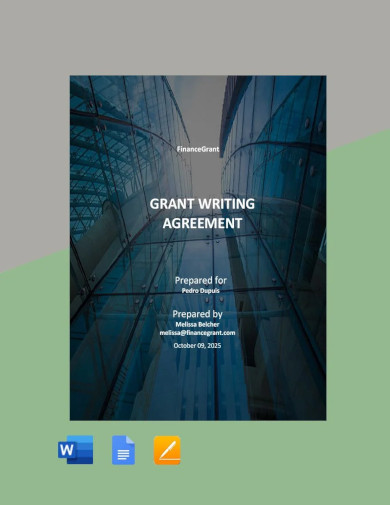
2. Introduction to Grant Writing Example
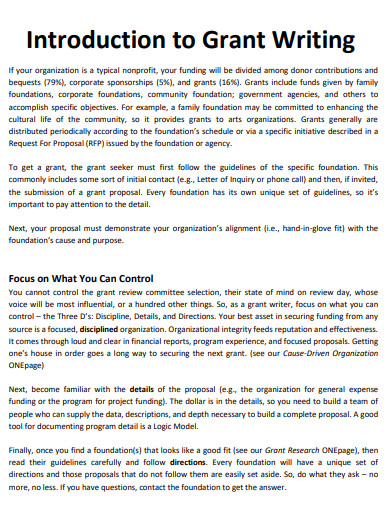
kpl.gov
3. Fundraising And Grant Writing Example
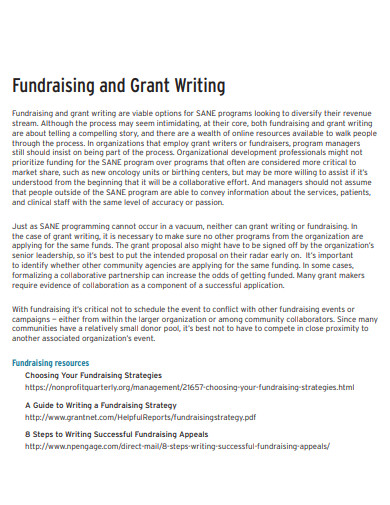
nsvrc.org
4. Steps to Grant Writing Example
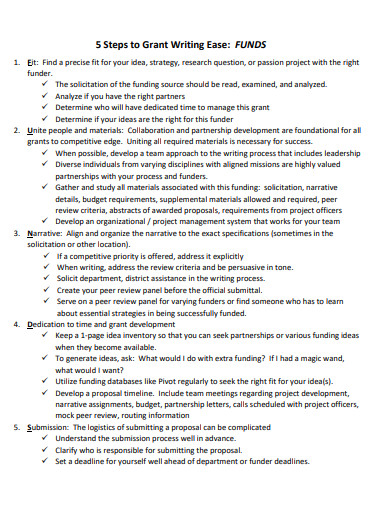
familia.coe.arizona.edu
5. Simple Grant Writing Example
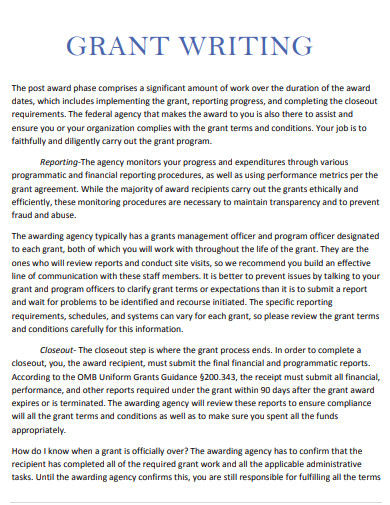
msun.edu
Types of Grant Writing
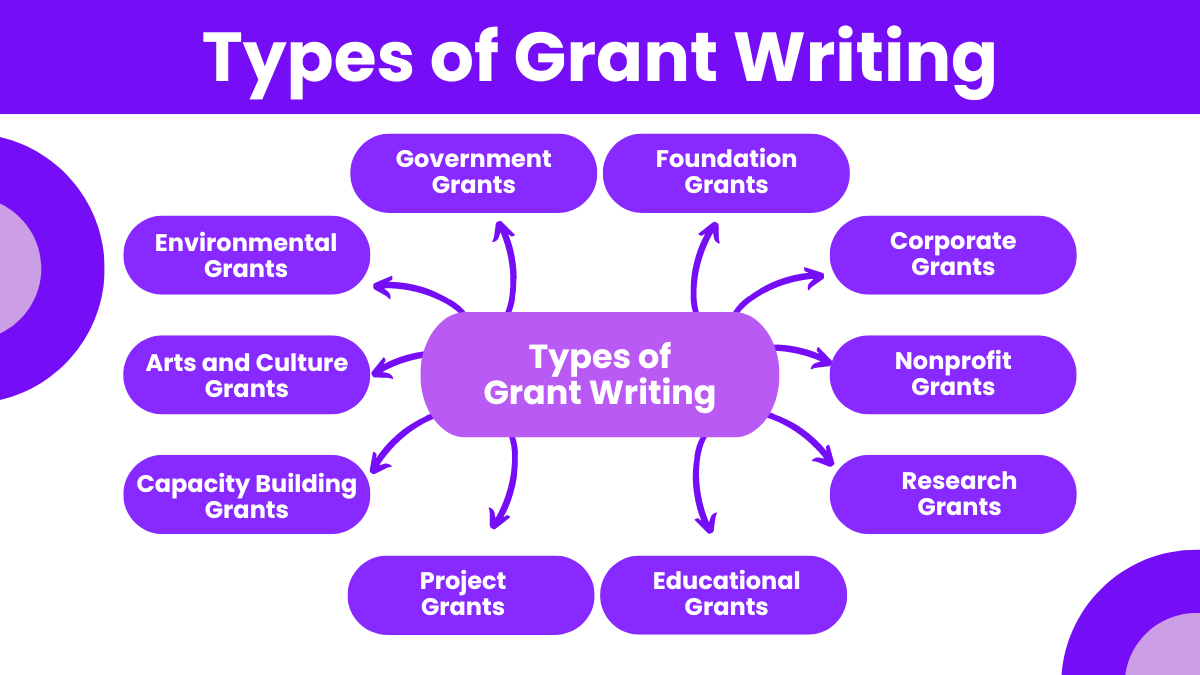
Grant writing is a critical skill for securing funding for various projects, research, and initiatives. Understanding the different types of grant writing can help you tailor your proposals to meet specific funding requirements and increase your chances of success. Below are the main types of grant writing:
1. Government Grants
Government grants are funded by federal, state, or local governments. These grants often have strict guidelines and reporting requirements. They are typically used for public projects, research, and community programs.
Examples:
- Federal Grants: Funded by the federal government for large-scale projects and research.
- State Grants: Provided by state governments for local initiatives and programs.
- Local Grants: Offered by municipal governments for community development projects.
2. Foundation Grants
Foundation grants are provided by private, family, or corporate foundations. These grants usually support nonprofit organizations, educational institutions, and community projects.
Examples:
- Private Foundation Grants: Funded by individuals or families, often focusing on specific causes or regions.
- Corporate Foundation Grants: Sponsored by corporations, aimed at supporting community and social responsibility initiatives.
3. Corporate Grants
Corporate grants are provided by businesses to support community initiatives, nonprofit organizations, and projects that align with their corporate social responsibility goals.
Examples:
- Community Development Grants: Support local projects that improve community welfare.
- Educational Grants: Fund educational programs, scholarships, and school improvements.
4. Nonprofit Grants
Nonprofit grants are designed for nonprofit organizations to support their programs, operations, and projects. These grants can come from government agencies, foundations, or other nonprofits.
Examples:
- Program Grants: Fund specific programs or projects within a nonprofit.
- Operating Grants: Provide general support for the nonprofit’s operational expenses.
5. Research Grants
Research grants fund scientific, medical, and academic research projects. These grants are often provided by government agencies, foundations, and educational institutions.
Examples:
- Scientific Research Grants: Support research in fields like biology, chemistry, and physics.
- Medical Research Grants: Fund research in medical and health-related fields.
6. Educational Grants
Educational grants support schools, teachers, and students. They can be used for scholarships, educational programs, and school improvements.
Examples:
- Scholarship Grants: Provide financial aid to students for their education.
- Teacher Grants: Fund professional development and classroom projects for teachers.
7. Project Grants
Project grants fund specific projects or initiatives. These grants can be provided by various sources, including government agencies, foundations, and corporations.
Examples:
- Community Project Grants: Support local projects that benefit the community.
- Innovation Grants: Fund innovative projects and new ideas.
8. Capacity Building Grants
Capacity building grants help organizations develop their infrastructure and capabilities. These grants can support strategic planning, staff training, and technology upgrades.
Examples:
- Infrastructure Grants: Fund the development of organizational infrastructure.
- Training Grants: Provide support for staff training and development programs.
9. Arts and Culture Grants
Arts and culture grants support projects and programs in the arts, including visual arts, performing arts, and cultural heritage.
Examples:
- Art Project Grants: Fund specific art projects and exhibitions.
- Cultural Preservation Grants: Support the preservation of cultural heritage and traditions.
10. Environmental Grants
Environmental grants fund projects and initiatives aimed at protecting the environment and promoting sustainability.
Examples:
- Conservation Grants: Support conservation efforts and wildlife protection.
- Sustainability Grants: Fund projects that promote sustainable practices and green technologies.
Purpose of Grant Writing
Grant writing serves a crucial role in securing funding for various projects and initiatives. Its primary purpose is to communicate the value and necessity of a project to potential funders. Below are the key purposes of grant writing:
1. Securing Funding
The foremost purpose of grant writing is to obtain financial support for projects, programs, and initiatives. This funding can come from government agencies, foundations, corporations, or other organizations.
2. Supporting Nonprofits and Community Organizations
Grant writing helps nonprofits and community organizations access funds needed to fulfill their missions. These funds can support various activities, from community development to providing essential services.
3. Advancing Research and Innovation
Grant writing is essential for securing funds for research and innovation. This includes scientific research, medical studies, and technological advancements.
4. Enhancing Educational Opportunities
Grants can significantly enhance educational opportunities by providing resources for schools, teachers, and students. This includes funding for scholarships, educational programs, and school improvements.
5. Promoting Arts and Culture
Grant writing supports the arts and cultural projects, ensuring the preservation and promotion of cultural heritage and artistic expression.
6. Fostering Organizational Growth and Capacity Building
Grants can help organizations grow and build capacity by providing funds for strategic planning, staff training, and infrastructure development.
7. Promoting Environmental Conservation
Grant writing is crucial for funding environmental conservation projects and sustainability initiatives. These grants support efforts to protect natural resources and promote eco-friendly practices.
8. Meeting Specific Community Needs
Grants can address specific needs within a community, such as healthcare, housing, and social services. Effective grant writing helps secure funds to meet these needs.
Grant Writing Benefits
Grant writing offers numerous benefits for individuals, organizations, and communities. Successfully securing grants can provide essential resources, support innovation, and promote growth. Below are the primary benefits of grant writing:
1. Financial Support
Grants provide crucial financial support for projects, programs, and initiatives. This funding can cover various costs, including salaries, equipment, materials, and operational expenses.
2. Program Development and Expansion
Grants enable organizations to develop new programs or expand existing ones. This can lead to increased services, outreach, and impact within the community or field.
3. Research and Innovation
Securing grants for research projects can lead to significant advancements in science, medicine, and technology. Grants support experiments, data collection, and the dissemination of findings.
4. Educational Opportunities
Grants enhance educational opportunities by funding scholarships, educational programs, and school improvements. This support helps students, teachers, and educational institutions thrive.
5. Arts and Culture Promotion
Grants support arts and cultural projects, ensuring the continuation and growth of creative endeavors. This includes funding for performances, exhibitions, and cultural preservation initiatives.
6. Organizational Growth and Sustainability
Grants help organizations build capacity and achieve sustainability. Funding can be used for strategic planning, staff training, infrastructure development, and other essential activities.
7. Community Development
Grants play a crucial role in community development by funding projects that improve the quality of life for residents. This includes initiatives in healthcare, housing, education, and social services.
8. Environmental Conservation
Grants support environmental conservation efforts, promoting sustainability and the protection of natural resources. This includes funding for conservation projects, sustainability programs, and environmental research.
9. Increased Credibility and Visibility
Successfully securing grants can enhance an organization’s credibility and visibility. Funders’ support serves as an endorsement of the organization’s work, which can attract additional funding and partnerships.
10. Networking and Collaboration
The grant application process often involves collaboration and networking with other organizations, researchers, and community members. These relationships can lead to new opportunities and strengthen existing partnerships.
11. Capacity Building
Grants can fund capacity-building activities that enhance an organization’s effectiveness and efficiency. This includes training, technical assistance, and the development of new skills and capabilities.
12. Addressing Unmet Needs
Grants allow organizations to address unmet needs within their communities or fields of work. This can lead to the creation of programs and services that fill critical gaps and improve overall well-being.
What is involved in Grant Writing
Grant writing is a detailed process that involves several steps to secure funding from various sources. Here are the key elements involved:
1. Identifying Funding Sources
- Research and identify potential grants from government agencies, foundations, corporations, and other organizations.
2. Understanding Grant Requirements
- Thoroughly understand eligibility criteria, application deadlines, funding limits, and evaluation criteria.
3. Developing a Project Plan
- Outline the project’s objectives, activities, timeline, and outcomes, and create a detailed budget.
4. Writing the Proposal
- Craft a compelling proposal including an executive summary, statement of need, project description, budget, evaluation plan, and sustainability plan.
5. Gathering Supporting Documents
- Collect and prepare necessary documents such as letters of support, resumes, organizational charts, and proof of nonprofit status.
6. Reviewing and Editing
- Thoroughly review and edit the proposal for clarity, coherence, consistency, and adherence to guidelines.
7. Submitting the Proposal
- Follow specific submission instructions and ensure the proposal is complete and submitted on time.
8. Follow-Up and Communication
- Maintain communication with the funder, confirm receipt, and address any additional questions or requests.
9. Managing Awarded Grants
- Effectively manage grant funds and project implementation, adhering to the budget and meeting reporting requirements.
How to Draft Grant Writing
Drafting a grant proposal is a detailed process that requires careful planning, research, and attention to detail. Here are the key steps involved in drafting an effective grant proposal:
1. Research and Identify Funding Sources
- Identify grant opportunities that align with your project goals.
- Review funding guidelines and eligibility criteria.
2. Understand the Grant Requirements
- Read the RFP (Request for Proposal) thoroughly.
- Clarify any questions with the funder.
3. Develop a Project Plan
- Define project objectives.
- Outline activities and methods.
- Create a project timeline.
- Develop a detailed budget.
4. Write the Proposal
- Executive Summary: Brief project overview and funding request.
- Statement of Need: Explain the problem or need with supporting data.
- Project Description: Detailed objectives, activities, and outcomes.
- Budget Justification: Explain and justify budget items.
- Evaluation Plan: Describe how success will be measured.
- Sustainability Plan: Explain post-grant project sustainability.
5. Gather Supporting Documents
- Collect letters of support, resumes of key personnel, organizational information, and proof of nonprofit status.
6. Review and Edit the Proposal
- Proofread for errors.
- Ensure clarity, consistency, and adherence to guidelines.
7. Submit the Proposal
- Follow submission instructions precisely.
- Ensure submission before the deadline.
8. Follow Up
- Confirm receipt of the proposal.
- Be available for any additional questions from the funder.
9. Prepare for Grant Management
- Plan for managing grant funds and reporting requirements.
- Track project progress to meet objectives.
How do I find grant opportunities?
Research online databases, government websites, and foundation directories. Network with other professionals and subscribe to grant newsletters.
What are the key components of a grant proposal?
Executive summary, statement of need, project description, budget, evaluation plan, and supporting documents.
How important is the budget in a grant proposal?
Very important. It should be detailed, realistic, and aligned with the project objectives, clearly justifying each expense.
How can I improve my chances of winning a grant?
Tailor your proposal to the funder’s guidelines, demonstrate a clear need, and show measurable outcomes and sustainability.
Can I apply for multiple grants simultaneously?
Yes, applying for multiple grants increases your chances of securing funding, but ensure each proposal is tailored to its respective funder.
What are common mistakes to avoid in grant writing?
Ignoring guidelines, vague objectives, unrealistic budgets, lack of evidence for need, and poor proofreading.
How long does it take to write a grant proposal?
It varies, but typically several weeks to months, depending on the complexity of the project and the funder’s requirements.
What should I do if my grant proposal is rejected?
Seek feedback, review and revise your proposal, and consider applying to other funding sources or reapplying in the future.
How do I demonstrate project sustainability in my proposal?
Detail plans for ongoing funding, partnerships, and strategies to maintain project activities after the grant period ends.
Do I need a professional grant writer?
Not necessarily. While helpful, especially for complex grants, many successful proposals are written by project leaders or team members with strong writing skills.



